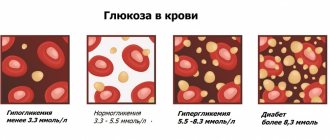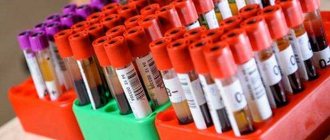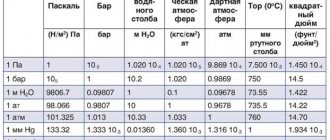HCG (human chorionic gonadotropin) is a hormone released during pregnancy. Using a laboratory blood test, the concentration of beta subunits is determined. Conception can be detected using this method as early as 6-8 days. The hCG test also differentiates a normal pregnancy from an ectopic one. The online hCG calculator will help you decipher the blood test. You will be able to track the dynamics of hormone growth indicators and be able to determine the duration of pregnancy.
APPOINTMENT WITH A GYNECOLOGIST - 1000 rubles. CONSULTATION WITH A GYNECOLOGIST ON THE RESULTS OF AN ULTRASOUND AND ANALYSIS - RUB 500!
CLICK TO SIGN UP
What is hCG - “beta”?
The content of the article
HCG is a hormone that is produced by the fetus itself, or rather by the fetal membrane of the embryo (chorion). The process begins immediately when the embryo is implanted into the uterus. At this moment, the fetus still looks like a small bubble of liquid, consisting of an embryoblast (from which the fetus will form in the future) and trophoblast (cells that form the chorion).
Under the influence of gonadotropin, the corpus luteum produces hormones that maintain the condition of the endometrium (the inner lining of the uterus) necessary for normal pregnancy. An increase in hCG concentration indicates that fertilization has taken place.
HCG contains:
- Alpha subunits. They are not determined because they have no diagnostic value during pregnancy.
- Beta subunits, which make it possible to determine the fact of conception and the period of fetal development.
That is why the term human chorionic gonadotropin in pregnancy tests refers to its beta component.
HCG: role in the body
The main function of hCG is a signal that a woman’s body needs to be rebuilt in connection with the onset of pregnancy. It affects sex hormones, activates increased production of estradiol, progesterone and estriol, which change the hormonal background of the expectant mother. By monitoring the activity of hCG, you can assess how the fetus is developing and what the likelihood of miscarriage is.
Human chorionic gonadotropin (hCG) in Moscow from day 1
from 450 ₽
Sign up
Pregnancy-associated plasma protein A (PAPP-A) in Moscow from day 1
from 850 ₽
Sign up
Placental lactogen in Moscow from 10 days.
from 880 ₽
Sign up
Starting from week 7, gonadotropin is responsible for the development of the corpus luteum, maintaining its functionality. There is an assumption that it suppresses the mother's immune system, due to which the fetus is not rejected.
Reference! The pregnancy test strip is based on a method for assessing the level of human chorionic gonadotropin in the blood. But in this case, the material being studied is urine, and in it the concentration of the hormone increases more slowly. Therefore, if a blood test can detect pregnancy on the second day after fertilization, the test can do this only after 7 days.
How do hCG levels change during pregnancy?
For the first time, an increase in beta-hCG levels is detected starting from the sixth day after conception. At first, the concentration of the hormone doubles every two days. Further, the increase in hCG concentration slows down and when the level reaches 1200 mU/ml, doubling begins to occur every 72-96 hours. Upon reaching 6000 mU/ml, growth occurs every 96 hours.
The concentration indicator is not just boring numbers: it is what helps determine the gestational age.
After 11 weeks, the hormone in the body becomes less, but its level is still increased. At 34 weeks, a second increase in hCG occurs. This surge, according to scientists, triggers labor. After childbirth, the level of beta-hCG in the blood gradually decreases.
HCG as part of pregnancy screening
The level of the hormone is determined in venous blood serum. No complex preparation is required for diagnosis. Biomaterial is collected in the morning.
General preparation rules:
- diagnostics are carried out on an empty stomach;
- the woman must inform the gynecologist about all medications used, because the drugs can affect the results of laboratory diagnostics;
- on the eve of donating blood, it is necessary to limit physical activity and eliminate the effect of unfavorable factors;
- other instrumental studies are carried out after diagnosis and determination of the level of pregnancy hormone in the blood.
After collection, the blood is placed in a centrifuge and then separated into fibrinogen and serum. Specialists then determine beta units using immunometric methods. The woman is informed of the result within 24 hours. The hCG level increases in proportion to the number of fetuses.
Online hCG calculator
The calculator will help you when deciphering blood tests for hCG. You will be able to monitor the growth dynamics of Beta-hCG and determine the duration of pregnancy.
The results indicated in the tables and the hCG calculator itself are approximate. To determine this hormone, various methods can be used and indicators may vary. Therefore, the analysis is deciphered where it was done. The units of measurement for the concentration of beta-hCG are also different. The concentration is indicated in honey/ml, mIU/ml, U/l and IU/l as well as U/l mIU/ml, IU/l. All indicators are the same and do not need to be recalculated. U stands for units, IU stands for international units, mIU/ml and U/l are the English display of units.
Analysis for hCG in non-pregnant women
The level of human chorionic gonadotropin can increase in the body of non-pregnant women with the development of the following pathologies or physiological conditions:
- Tumors in internal organs.
- Neoplasms or other pathologies of the ovaries.
- Tumors of the uterus.
- Hydatidiform mole is a pathological pregnancy.
- A tumor that occurs when the chorionic epithelium becomes malignant.
- Miscarriage or abortion less than a week ago.
- Use of hormonal medications that contain gonadotropin. As a rule, they are prescribed at the preparatory stage before IVF.
- Childbirth - After childbirth, gonadotropin levels remain elevated for approximately 7 days. After which it gradually decreases and reaches 5 mU/ml.
- Menopause - after the final cessation of menstrual bleeding, hCG can increase to 14 mU/ml, which is a normal value for a woman during this period.
Beta-hCG levels at different stages of pregnancy
| Days after last menstruation | Gestation period (days/weeks) | HCG in honey/ml |
| 26 | 12 | 0-50 |
| 27 | 13 | 25-100 |
| 28 | 14 (2 weeks) | 50-100 |
| 29 | 15 | 100-200 |
| 30 | 16 | 200-400 |
| 31 | 17 | 400-1000 |
| 32 | 18 | 1050-3000 |
| 33 | 19 | 1450-4000 |
| 34 | 20 | 1940-5000 |
| 35 | 21 (3 weeks) | 2600-6500 |
| 36 | 22 | 3400-8500 |
| 37 | 23 | 4400-10800 |
| 38 | 24 | 5700-13700 |
| 39 | 25 | 7200-17000 |
| 40 | 26 | 9000-21000 |
| 41 | 27 | 10100-23300 |
| 42 | 28 (4 weeks) | 11200-2550 |
| 43 | 29 | 13700-30900 |
| 44 | 30 | 16600-36500 |
| 45 | 31 | 19900-43000 |
| 46 | 32 | 25500-50200 |
| 47 | 33 | 27450-57650 |
| 48 | 34 | 31700-65400 |
| 49 | 35 (5 weeks) | 36100-73200 |
| 50 | 36 | 40700-81150 |
| 51 | 37 | 45300-88800 |
| 52 | 38 | 49800-96000 |
| 53 | 39 | 54100-102500 |
| 54 | 40 | 58200-108200 |
| 55 | 41 | 61640-112800 |
| 56 | 42 (6 weeks) | 64000-116310 |
Concentration of chorionic gonadotropin at later stages
| Duration in weeks | HCG concentration honey/ml |
| 7 | 65000 — 155000 |
| 8 | 67500 — 190000 |
| 9-10 | 70000 — 211000 |
| 11-12 | 13500 — 63000 |
| 13-14 | 1200 — 71000 |
| 15-25 | 8000 — 60000 |
| 26-37 | 5000 — 55000 |
What are the functions of hCG
The main task of human chorionic gonadotropin is to maintain the functioning of the corpus luteum, which produces progesterone. At the same time, under the influence of hCG, a very large amount of progesterone is produced, significantly exceeding the normal levels for a non-pregnant woman.
Progesterone is one of the most important pregnancy hormones. Thanks to progesterone, the uterus does not reject the implanted embryo. Under the influence of progesterone, the uterus stops contracting and increases in size. A decrease in progesterone can provoke miscarriage.
The corpus luteum forms at the site of a ruptured follicle after ovulation (the release of a mature egg). In a normal menstrual cycle, the corpus luteum exists for about 12-15 days, after which it resolves. Human chorionic gonadotropin prevents this from happening and the corpus luteum continues to produce progesterone until the placenta matures and continues to synthesize the required amount of progesterone. Thus, this hormone is actively produced until 11-12 weeks of pregnancy.
Other functions of human chorionic gonadotropin include the influence on the mechanisms of adaptation of the female body to pregnancy. Pregnancy is stressful for the body, and in order to speed up the process of normalizing its work, there is an increased secretion of adrenal hormones - glucocorticoids. At the same time, hCG, having corticotropic properties, helps to increase steroidogenesis.
Human chorionic gonadotropin is also used to stimulate ovulation. To eliminate infertility during anovulatory cycles or during artificial insemination or in vitro fertilization protocols, hCG is used to successfully complete the development of follicles and provoke the release of the egg. An HCG injection is a mandatory part of any IVF protocol.
In Kaliningrad, IVF and other methods of assisted reproductive technologies can be performed at the IVF Center reproductive clinic. The clinic’s specialists have extensive experience in eliminating both female and male infertility.
Why is a beta-hCG blood test more sensitive than a drugstore test?
Pregnancy tests are not accurate for the following reasons:
- The concentration of hCG in urine is almost two times lower than in the blood, so even the most sensitive test will give a false negative result in the early stages.
- Human chorionic gonadotropin tests sold in pharmacies are capricious and may not work correctly. Reasons: inaccurate analysis, expired reagent, improper storage of the test.
- If you drink a lot of water in the evening or take a diuretic, the test will not detect pregnancy. Tests also give false negative results for kidney diseases.
Every year there are thousands of mothers in the world who for a long time did not imagine their “interesting situation”, trusting pharmacy strips.
HCG during pregnancy
| Period (weeks after conception) | HCG indicators |
| 1–2 | 25–156 |
| 2–3 | 101–4870 |
| 3–4 | 1110–31500 |
| 4–5 | 2560–82300 |
| 5–6 | 23100–151000 |
| 6–7 | 27300–233000 |
| 7–11 | 20900–291000 |
| 11–16 | 6140–103000 |
| 16–21 | 4720–80100 |
| 21–39 | 2700–78100 |
Reference! The data presented are averages; in addition, each laboratory has its own unit of measurement of hormone levels and its own rating scale.
Reduced concentration of hCG during pregnancy:
- If the indicators decrease by 50% or more relative to the norm, we can talk about an existing threat.
- Fetal development problems.
- Chromosomal abnormalities in the fetus, such as Edwards syndrome.
- With a sharp decrease in indicators in the second and third trimester, a frozen pregnancy or fetal death is possible. In this case, at the beginning, hCG is normal, and then stops increasing or decreases sharply.
- Ectopic pregnancy.
- Diabetes.
- If the concentration of the hormone decreases in the later stages, post-term pregnancy is possible.
If the analysis result shows a low level, do not immediately panic and draw conclusions. The gynecologist could have made a mistake with the date of expected conception, which happens quite often when a woman gives inaccurate information about her cycle, on the basis of which the day of ovulation is calculated.
Increased concentration:
- Early toxicosis.
- Postmaturity of the fetus.
- Incorrect deadline.
- Chromosomal abnormalities - if hCG rises sharply in the 2nd trimester, the fetus may develop Down syndrome.
- Multiple pregnancy - in this case, the level of hCG in the first weeks of pregnancy may exceed the norm by 2-3 times. This is due to the fact that the hormone is produced by several membranes at once.
How is a human chorionic gonadotropin test taken?
For the analysis, blood from a vein is needed in the morning on an empty stomach. Measurement of beta-hCG concentration is performed no earlier than 3-5 days after a missed period. When taking hormones, you need to inform your doctor about this - they can affect the concentration of hCG.
To diagnose congenital pathologies (perinatal screening), an hCG test is performed at 14-18 weeks. Determination of hCG in men and non-pregnant women (analysis for tumor markers) can be carried out on any day.
Preparing to donate blood for hCG levels
The results of the study will correspond to reality only if the woman is properly prepared for taking it. Blood for analysis is taken from the cubital vein. The study may require at least five milliliters of liquid.
Two days before donating blood, a woman should change her diet. Fried and fatty foods, smoked meats, pickles and marinades are excluded from the menu. Dishes must be dietary and not contain spicy seasonings. At the same time, you must stop drinking alcohol and stop smoking two hours before donating blood. If a woman is taking any pharmaceutical drugs, she should warn the laboratory technician about this.
Blood is donated in the morning, on an empty stomach. If it is not possible to carry out the procedure in the morning, then the break between the last meal and venipuncture should be at least six hours. Only then will it be possible to correctly interpret the results of the analysis.
The concentration of beta-hCG is different from the norm, what does this mean?
The online hCG calculator only works to determine pregnancy. If pregnancy is not confirmed and there are no other signs of pregnancy, you need to make an appointment with an oncologist. An increase in the hCG hormone can occur in both non-pregnant women and men. This indicates malignant tumors of the uterus (chorionepithelioma, chorionic carcinoma) or testicles. An increase in the hormone is also observed in cancer of the bladder, kidneys, intestines, and lungs.
| Excess hCG | Decreased hCG |
| Multiple pregnancy. In case of twins or triplets, the level is proportional to the number of embryos | Risk of miscarriage |
| Toxicosis | Death of an embryo or fetus |
| Down syndrome (more research needed) | Frozen pregnancy |
| The term is incorrectly defined | Placental insufficiency |
| Post-term pregnancy | |
| Ectopic pregnancy | |
| Hydatidiform mole | |
| Pregnancy after stimulation or IVF |
If a high level of hCG persists after an abortion, this indicates an incomplete abortion - incomplete removal of the fertilized egg or an ongoing pregnancy. Gonadotropin levels also increase when taking hormonal medications.
When should you take a β-hCG test?
For women:
early diagnosis of pregnancy; prenatal screening of fetal development pathologies; amenorrhea; diagnosis and control of treatment of trophoblastic pathologies; dynamics of chronic placental insufficiency; suspicion of threatened spontaneous abortion or frozen pregnancy; suspicion of ectopic attachment of the embryo; monitoring the course of pregnancy over time; control over the implementation of artificial abortion. For men:
differential diagnosis of testicular tumors.









